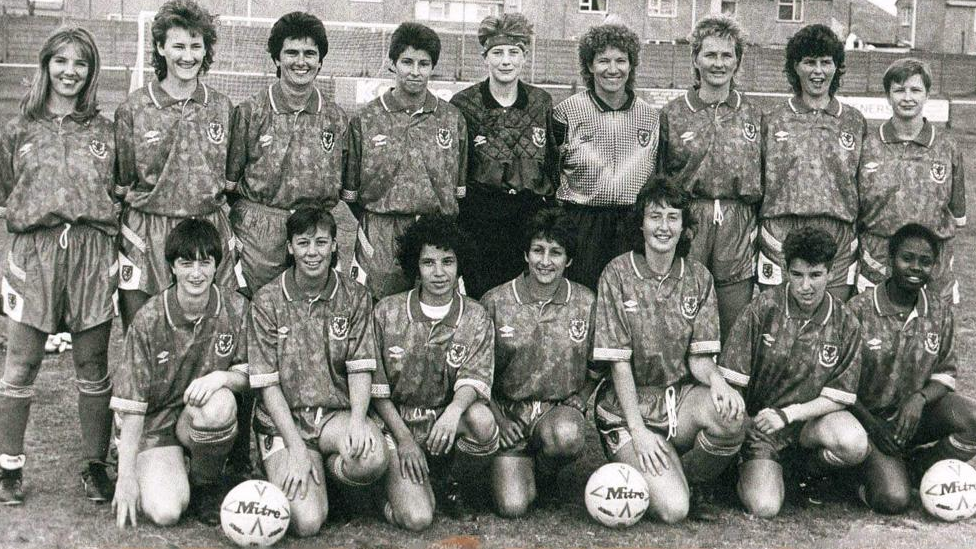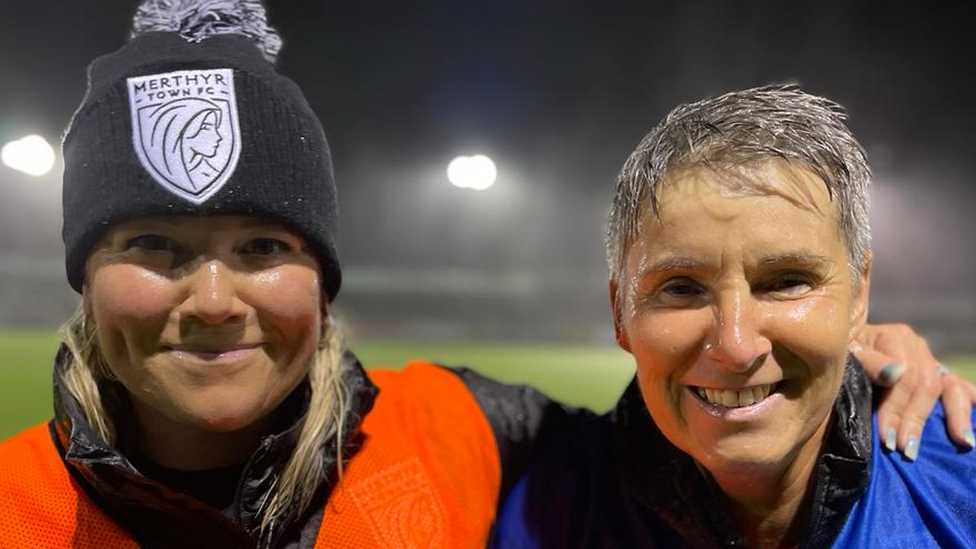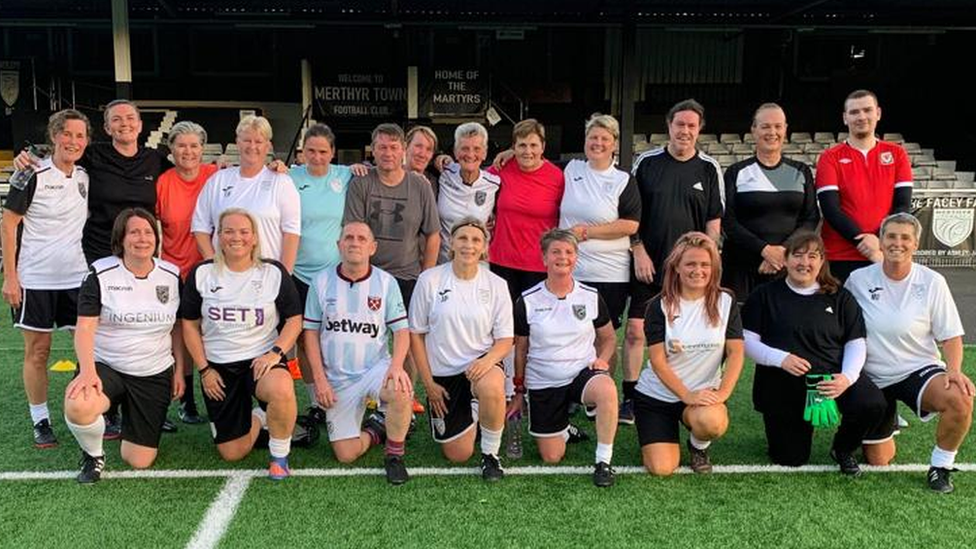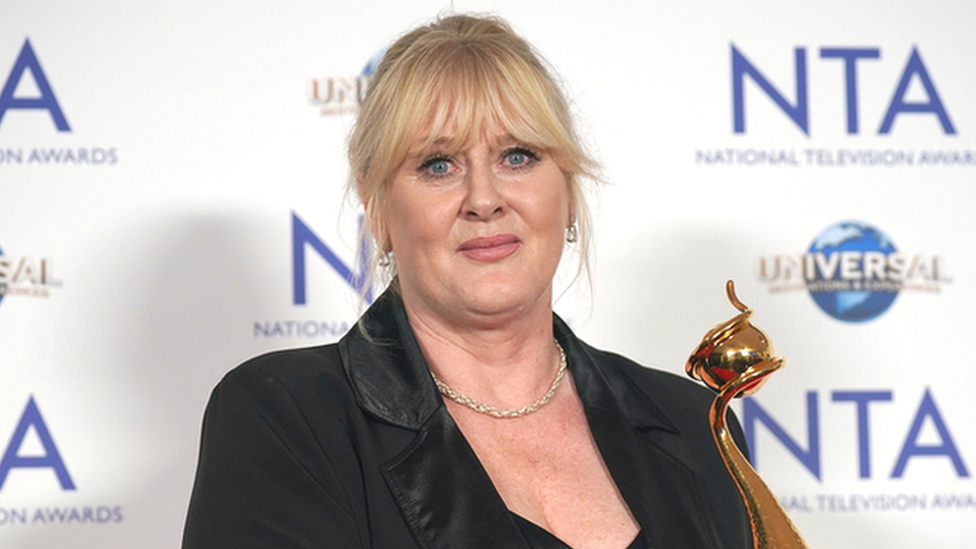Menopause: Could walking football help women?
- Published
Female footballers say sport is helping them through the menopause
Mandy Gornicki thought her football days were behind her.
The ex-Wales women captain hung up her boots aged 49, but a chance encounter in a café saw her secure another cap for her country - this time in the women's walking football team.
Only after work with university students evaluating the health impacts of sport at her club in Merthyr Tydfil did she come to appreciate the benefits it brings.
"It's changed my life. My husband says 'you come back from [walking] football and you're alive'."
She said it was only after a few months in the side that she looked at her team and thought: "Do you know what? We are all either going through, been through or are gonna go through that big thing which is called the menopause."

Mandy Gornicki (fourth from the left, back row) played for the first Wales women's team in 1993
While it affected players in different ways, she said the team provided a safe space for those discussions, something she "never had when I was going through it".
She said women often stopped playing other team sports by the time they were in their late 30s.
"When you need that support of those women you've lost it, haven't you?"
As the minimum age for her walking football team is 40, she said that allowed that to come back.
Researchers at the University of South Wales have been looking at the perceived physical, social and psychological benefits of walking football, as well as the impact of exercise on perimenopausal and post-menopausal women.
Master's student Egan Goodison said: "Being involved in the game has offered the women a new avenue in which to get support while they are either going through menopause, or are perimenopausal."
She added that the camaraderie involved in women's walking football teams was "very much appreciated".

Mandy Gornicki (right, pictured with teammate Sharon Jones) said she "didn't realise how much I missed the group thing until I came here"
Tania James has focused her Master's research on the impact of different types of exercise for those women.
"We know there's 32 physical symptoms of perimenopause and menopause and 26 emotional states that we can measure.
"So I'm looking at independent activity, such as just going out for a run, or group activities such as a yoga or spin class, and then I'm looking at whether team sports show any differences in supporting menopausal symptoms effectively."
Growing up on a coal board estate, Mandy played football on "the patch" every day with her three older brothers, while watching Match of the Day with her dad was considered special time together.
But, come Saturday, she would have to stand and watch because girls were not allowed to play, which "just felt wrong", she said.
She was 26 by the time she was able to play for a women's 11-a-side team.
By then she was a physical training instructor in the Army and was selected to play for Wales against Iceland in 1993 in Port Talbot.
She said: "I remember the kit we had on, the under-21s had played in it the day before, so they chucked it in the launderette.
"The shorts were too big, the shirts were massive, but it didn't matter. We had kit and we played an international game of football."
Hot on its heels were the European Championships against Germany, Switzerland and Croatia - in the final match, Mandy was asked to be captain.
"That gave me goosebumps. That was the pinnacle for me, to captain Wales."

Merthyr Tydfil walking football team is for the over-40s
But by this stage she was 30 and working full-time managing sports centres in Somerset, where time off on the weekends was difficult to negotiate.
So she came to the tough decision to walk away - although she carried on playing for her local side in Bridgewater until she was 49.
"I was going to try and hold out until 50, but by that stage I was in the police - doing shift work. Menopause kicked in and my body was saying 'this is silly now'."
It was that chance encounter with a men's walking football team in a mid Wales café that opened the door to a fresh take on a familiar sport.
By now she had retired and was living back in Wales and, in the summer of 2022, she established the women's walking football team in Merthyr Tydfil for the over-40s.
Her teammate Sharon Jones first played football in college for Bangor City Ladies.
Now 51 and living in Merthyr, she has only recently given up the 11-a-side game in favour of walking football and has been selected to play for Wales.
"I would have loved to have been a Welsh international footballer at running football, but it was never my time. But I've still got a Welsh walking football cap," she said.
Sharon said staying fit was a big priority for her and her wife as they bring up their two-year-old son, particularly if Sharon is to pass on her love of the game to him.
Lyn Jehu, a lecturer in community football development at the University of South Wales, said he perception of walking football was often that it was for older men.
But he sees it as the perfect gateway for those who would not otherwise get involved in physical activity - such as those with trauma-related issues, victims of domestic abuse or those from ethnically diverse communities.
"It's non-contact and there's no issue about playing in traditional clothing because you can play in anything you're comfortable in," he said.
Students at the university have been researching the physical, social and psychological benefits of the sport, specifically in former coal mining communities.
"We know we've got issues here with lower life expectancy, far higher rates of mental health problems and various co-morbidities like higher rates of coronary heart disease, type 2 diabetes, certain types of cancer," said Lyn.
"Walking football can be a preventative form of medicine and can really help people get involved in football."

TRAIN, COMPETE, SLEEP AND REPEAT: Welcome to the world of competitive ballroom dancing
INVISIBLE DISABILITIES: Spreading awareness and helping others

Related topics
- Published18 October 2023

- Published10 September 2023

- Published3 April 2023
